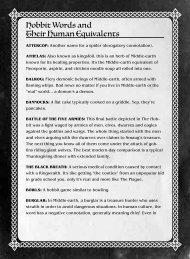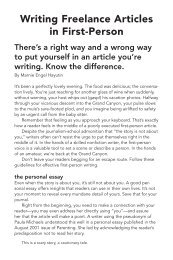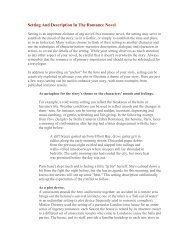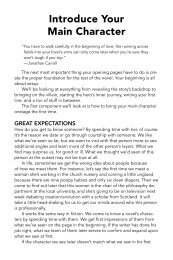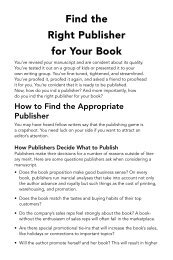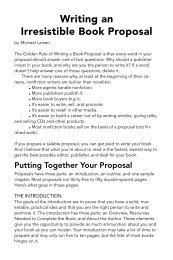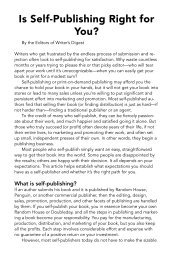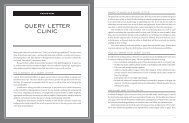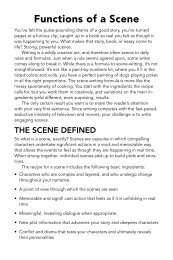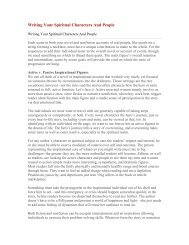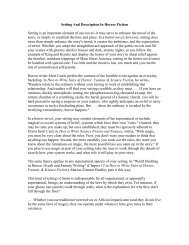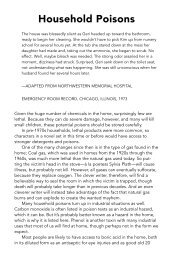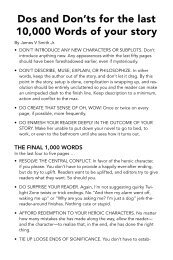How to Find Your Poetic Voice - Writer's Digest
How to Find Your Poetic Voice - Writer's Digest
How to Find Your Poetic Voice - Writer's Digest
Create successful ePaper yourself
Turn your PDF publications into a flip-book with our unique Google optimized e-Paper software.
<strong>How</strong> <strong>to</strong> <strong>Find</strong> <strong>Your</strong> <strong>Poetic</strong><br />
<strong>Voice</strong><br />
Without a distinctive, controlled<br />
voice, you can’t stake a claim <strong>to</strong> originality.<br />
Here’s how one poet learned <strong>to</strong><br />
track down her own voice.<br />
By Laurie Zupan<br />
Many years ago, a poetry professor <strong>to</strong>ld me I wasn’t ready for grad<br />
school because I didn’t have a poetic voice. As a budding poet, that was<br />
difficult <strong>to</strong> hear. But once I got over my initial hurt feelings, I realized that<br />
what I didn’t have was a clear, working definition of poetic voice. So I set<br />
out <strong>to</strong> find one—with the goal of honing my voice and the hope that,<br />
with the knowledge I might gain, I’d land myself in a graduate program.<br />
Turns out that poetic voice is difficult <strong>to</strong> define, but it has <strong>to</strong> do with<br />
the distinctive characteristics<br />
of a particular poet’s work. As readers, we often recognize a writer’s<br />
work before we see his or her name. After all, who can imagine reading<br />
an e.e. cummings poem and not knowing immediately that he wrote it<br />
Sylvia Plath, Russell Edson, Joseph Brodsky, Phillip Whalen—they all have<br />
distinct styles that make their work uniquely their own.<br />
<strong>Poetic</strong> voice is rooted in the use and repetition of specific elements—<br />
technical elements that make a poem recognizable as belonging <strong>to</strong> one<br />
poet. I’ve identified these elements as grammar and syntax, form, music,<br />
subject matter and, last, magic—the elusive connection between a<br />
reader and a poet that transcends the work. Let’s look at each element in<br />
detail.<br />
1. Grammar and syntax<br />
Cummings’ willingness <strong>to</strong> use grammar in unconventional ways defined<br />
his voice. Try <strong>to</strong> count how many rules he flouts in his poem the Cambridge<br />
ladies who live in furnished souls:
the Cambridge ladies who live in furnished souls<br />
are unbeautiful and have comfortable minds<br />
(also, with the church’s protestant blessings<br />
daughters, unscented shapeless spirited)<br />
they believe in Christ and Longfellow,both dead,<br />
are invariably interested in so many things—<br />
at the present writing one still finds<br />
delighted fingers knitting for the is it Poles<br />
perhaps. While permanent faces coyly bandy<br />
scandal of Mrs. N and Professor D<br />
….the Cambridge ladies do not care,above<br />
Cambridge if sometimes in its box of<br />
sky lavender and cornerless,the<br />
moon rattles like a fragment of angry candy<br />
<strong>How</strong> do you use grammar in your poetry Is your use consistent Do<br />
you have good reasons for the things you do What happens when you<br />
play with grammar in a specific poem—for instance, how does the poem<br />
read with no punctuation Or what if you overpunctuate it <strong>How</strong> do<br />
those changes affect the poem as a whole<br />
Syntax, the order in which words are arranged, can make a line read<br />
smoothly, or not. It can create distance or closeness. It can convey feeling.<br />
Langs<strong>to</strong>n Hughes wrote much of his poetry for a working-class audience.<br />
The organization of his poems, as well as his word choices (which<br />
often included street slang), was devised specifically <strong>to</strong> connect with that
audience. Here’s an example from his poem Air Raid Over Harlem:<br />
You’re not talkin’ ’bout Harlem, are you<br />
That’s where my home is,<br />
My bed is, my woman is, my kids is!<br />
Harlem, that’s where I live!<br />
Look at my streets<br />
Full of black and brown and<br />
Yellow and high-yellow<br />
Jokers like me.<br />
<strong>How</strong> do you approach syntax and word choices in your work Who’s<br />
your intended audience <strong>How</strong> have these choices helped facilitate a connection<br />
between the audience and you<br />
Try substituting different types of words <strong>to</strong> see how they change your<br />
poems. For example, if you often use long Latinate words like perspiration,<br />
try using a shorter word like sweat. What’s the effect Don’t worry if<br />
you don’t like what you see. No matter what changes and substitutions<br />
you make, you’re always free <strong>to</strong> return <strong>to</strong> your original choices.<br />
2. Form<br />
Shakespeare’s famous for his sonnets. Basho wrote haikus. What forms<br />
do you most often use Why What binds the form, content and mood of<br />
your work Try a new form. If you always write in free verse, try a sonnet<br />
or couplets—maybe some structure will be good for you. Do you always<br />
write in iambic pentameter Try free verse. See what happens.<br />
For a couple of great guides <strong>to</strong> poetic forms, check out The Teachers<br />
and Writers Handbook of <strong>Poetic</strong> Forms by Ron Padgett (Teachers and<br />
Writers Collaborative) and The Making of a Poem: A Nor<strong>to</strong>n Anthology<br />
of <strong>Poetic</strong> Forms by Mark Strand and Eavan Boland (W.W. Nor<strong>to</strong>n and<br />
Company).
3. Music<br />
What can music do <strong>to</strong> support voice Alliteration, rhyme, assonance,<br />
prosody and the actual sounds of letters all contribute <strong>to</strong> the music of a<br />
poem. The poet Stephen Dobyns points out that specific sounds evoke<br />
certain emotions. Consonant plosives (usually referred <strong>to</strong> as the sounds<br />
made by the letters d, b, p, c, t and k) lend themselves <strong>to</strong> a fast pace and<br />
explosive action. When making those sounds, the mouth exhales a puff<br />
of air, often with force. In contrast, the consonant sounds that are longer<br />
in duration (f, th, sh, l and wh) provide a softer sound and calmer feel.<br />
Sylvia Plath’s poem Daddy illustrates these concepts well. Just reading<br />
the title, the reader finds his mouth making two plosive consonant<br />
sounds, for the first d sound and the second. In addition, the mouth is<br />
required <strong>to</strong> make the long e sound at the end of the word, emphasizing<br />
the sharpness of the consonants before it. Those sounds continue<br />
throughout the poem, as the first stanza indicates:<br />
You do not do, you do not do<br />
Any more, black shoe<br />
In which I have lived like a foot<br />
For thirty years, poor and white,<br />
Barely daring <strong>to</strong> breathe or Achoo.<br />
Read your poems aloud. <strong>How</strong> do they sound Try taping yourself.<br />
What do you notice Does the sound contribute <strong>to</strong> your meaning What<br />
letter sounds do you often use What happens if you change some of<br />
them<br />
4. Subject matter<br />
Sharon Olds writes extensively about her father’s death. Robert Frost<br />
wrote about nature and mortality. Are you preoccupied with a certain<br />
subject What draws you <strong>to</strong> it Maybe you shouldn’t hem yourself in so<br />
much—try approaching other <strong>to</strong>pics or ideas <strong>to</strong> write about. Or if your<br />
poems run the <strong>to</strong>pical gamut, try writing a series of poems on a particular<br />
theme. Whichever approach you take, you’ll learn new things about your<br />
voice.
5. Magic<br />
Once you become accus<strong>to</strong>med <strong>to</strong> playing with poetic elements, you’ll<br />
come <strong>to</strong> know which changes <strong>to</strong> stick with and which <strong>to</strong> file away. You’ll<br />
know because when a poem works, when its voice is right, some new<br />
truth is shared between reader and writer. The voice of the poem will<br />
transcend its parts. When that happens, you know you’ve succeeded as a<br />
poet.<br />
Be mindful of your voice, play with it, and make careful decisions as<br />
you construct your poems. <strong>Your</strong> hard work will result in poetry that makes<br />
connections, imparts wisdom and is a joy <strong>to</strong> write and read.<br />
My exploration of voice led <strong>to</strong> a greater understanding of my own<br />
abilities, and it taught me how <strong>to</strong> manipulate my own voice <strong>to</strong> get the<br />
most out of each poem. And by the way—not only did I get in<strong>to</strong> grad<br />
school, but I had the time of my life. So there, Professor.<br />
Laurie Zupan’s poetry has been published in Lost and Found, Medicinal<br />
Purposes, a Plymouth Writers Group anthology and other publications. She<br />
earned an M.F.A. in creative writing from Antioch University in 2001.



